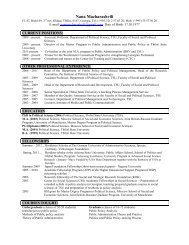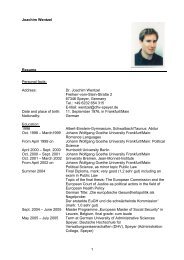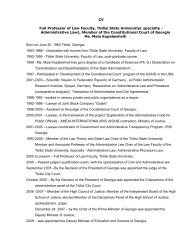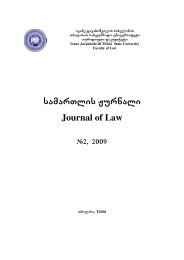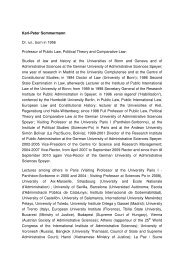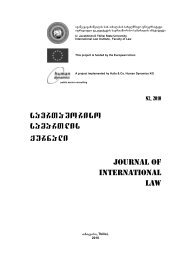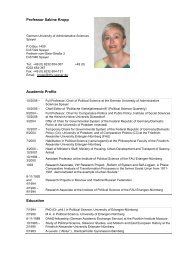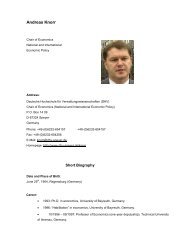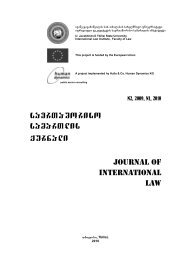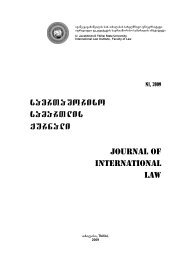Untitled
Untitled
Untitled
Create successful ePaper yourself
Turn your PDF publications into a flip-book with our unique Google optimized e-Paper software.
saerTaSoriso samarTlis Jurnali, #1, 2008 JOURNAL OF INTERNATIONAL LAW, N1, 2008<br />
Each of the factors shall be considered<br />
separately and their cumulative effect shall be<br />
assessed therein afterwards.<br />
1. THE COMPLEXITY OF A CASE<br />
“In criminal, as well as civil cases, in order<br />
not to establish a violation, a State shall prove<br />
that the length of proceedings was preconditioned<br />
by the complexity of the case”. 31<br />
Even more, “the Court considers the complexity<br />
of the case before assessing the conduct<br />
of the State bodies or of an applicant”. 32<br />
When assessing the complexity of the<br />
case the factors such as the aspects of the<br />
law, as well as volume of evidence, a number<br />
of the charges or the accused, the necessity<br />
of acquiring the expert opinions, receiving the<br />
witness statements from abroad, unification of<br />
the cases in one proceeding, are taken into<br />
consideration”. 33<br />
As mentioned already, one of the most<br />
important factors taken into consideration by<br />
the Court when assessing the complexity of<br />
the case is a number of the participants of the<br />
proceedings.<br />
For example, in the case Union Almentaria<br />
Sanders S.A. v. Spain the Government submitted<br />
that the case was fairly complex, as<br />
there were several defendants, against whom<br />
different claims were being made. The European<br />
Court underlined that only one of the<br />
defendants appeared before the Court of First<br />
Instance and none of them before the Court<br />
of Appeal which simplified the task of those<br />
courts”. 34<br />
In the case Angelucci v. Italy the court concluded<br />
that the case was undoubtedly of some<br />
complexity owing to the number of accused”. 35<br />
A State can cite the complexity of a case<br />
as a justification only in extremely exceptional<br />
situations, when such circumstances are revealed<br />
that are unusual for the court practice<br />
and its prediction in advance is impossible.<br />
A number of plaintiffs and accused may<br />
be high in many instances and the court shall<br />
be therefore accordingly prepared for that.<br />
One of the easiest ways out of the situation is<br />
separation of proceedings or consideration of<br />
a case by several judges. Citing the problem<br />
which is subjected to regulation can not be<br />
considered as a justification.<br />
Along with studying legal issues and factual<br />
circumstances of the case, the European<br />
Court pays due attention to the procedural<br />
matters. The number and the duration of the<br />
employed procedural actions and measures<br />
undertaken do indeed determine the complexity<br />
of the case.<br />
In this respect the case of Foti and others<br />
v. Italy is of a particular interest. In its submission<br />
the Government asserted that the preliminary<br />
investigation involved a large number<br />
of measures. The Court noted that the offences<br />
of which the applicants were accused can<br />
in themselves scarcely be described as complex.<br />
As offences committed in public and established<br />
on the spot, they should not have<br />
given rise to a difficult process of preliminary<br />
investigation. Furthermore, except in the second<br />
Foti case, they were dealt with at one jurisdictional<br />
level alone. The applicants’ cases<br />
were thus not especially complex”. 36<br />
One of the interesting cases of the complex<br />
cases is parallel proceedings in both –<br />
civil and criminal cases:<br />
In the case Gunter v. Turkey the Respondent<br />
Government submitted that the applicant's<br />
case was a complicated inheritance dispute.<br />
There were two proceedings pending at<br />
the same time. The case could not have been<br />
essentially considered until the case concerning<br />
the certificate of inheritance was not finalised.<br />
The Court observed that the proceedings<br />
were not complex. 37<br />
In the case Boddaert v. Belgium the Strasbourg<br />
Court did not consider the term of six<br />
years and three month unreasonable, as the<br />
complex circumstances related with the murder<br />
and a parallel investigation of two cases<br />
were involved. 38<br />
Conducting the parallel proceedings is the<br />
factor, which can be justly referred to by a state<br />
when claiming the complexity of the case.<br />
The instances of maintaining by a Government<br />
of complexity of the proceedings due<br />
to the fact that there was a need of the expert<br />
evidence are frequent.<br />
In the case Vernillo v. France the Respondent<br />
Government was alleging that the case<br />
was complex. One of the reasons for that was<br />
the need to seek an expert opinion. The Court<br />
did not agree with the position. 39<br />
In the case Nowicky v. Austria the applicant<br />
was requesting the issuing of a licence<br />
to produce the medicament. The Government<br />
argued that the proceedings were complex<br />
namely in that their very nature necessitated<br />
118



